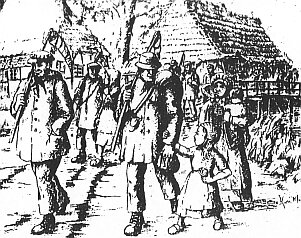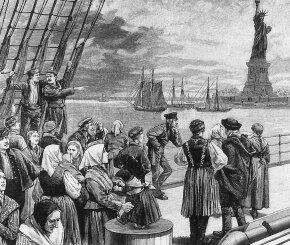Hope for bread, liberty and freedom
from Rudi Timphus, translated by Stephan Honkomp
Even 30 % of Steinfeld`s population emigrated between 1830 and 1880. 30 % left their home-country, their families, relatives, friends and neighbours. How big must have been the misery and despair in those days, to make this step with a heavy heart. And how many people would have liked to do the same, but could not.
All the villages in Südoldenburg were overpopulated, scanty soil and no fertilizer, little farms, on which every farmer had four to six hireling-families. 40 or 50 people lived on one farm – and the farm had to feed them all. People needed to have a 2nd job for having a little income. They were spinning and weaving wool and binding brooms and baskets. But who on earth should buy this?
 After the 30-years-war from 1618-1648 people took the walk to Holland, or went to sea for fishing. A hard job. They worked from sunrise ´til sundown and had to be back home to the harvest time. Time passed …. the income was not pretty good, many people died on a nervfever which was „imported“ from the Hollandgang. And many young people from 14 up to 30 went to sea. The misery was great and so many of them risked their own life on sea. And „the last exit, the last chance“ for the poor people was the emigration.
After the 30-years-war from 1618-1648 people took the walk to Holland, or went to sea for fishing. A hard job. They worked from sunrise ´til sundown and had to be back home to the harvest time. Time passed …. the income was not pretty good, many people died on a nervfever which was „imported“ from the Hollandgang. And many young people from 14 up to 30 went to sea. The misery was great and so many of them risked their own life on sea. And „the last exit, the last chance“ for the poor people was the emigration.
What happened in families in farm- und hireling-houses in the 19th century. All was uncertain. Nobody knew exactly what would happen, what could they expect in America. There is a saying from that time, which is still alive and „free translated“: „If you have enough bread, stay here, you don´t have to go only for the butter to America.“
Discussions through days & nights, weeks and months. Who should go first? What happens with the parents? Everybody knew, the one who emigrated wouldn´t come back. But last but not least the temptation was too big and they hoped for a better future. It sounds a little bit makabre, but often it was the truth. Many were waiting with their emigration until ir parents died.
There´s a letter of a Steinfeld emigrant. He wrote: „Yes, so the world goes. Families living together having their bread, talk together and then comes the day, on which they moved away from each other. It´s like a cannonball, which all people fall apart and nobody knows where the other is gone. We should believe, that we´ll see us next time in the eternity.“
Warnings came from the Government in Oldenburg against the so called „addiction to emigration“, because many many young people left the duchy Oldenburg and the old people stayed here. The duke threatened the people „If you go, you´ll lose your nationality forever“! But what should the lose.
 The main reasons for the emigration were:
The main reasons for the emigration were:
- 1) the pressure from the farmer
- the hireling had to help any time the farmer wanted to
- the hire-rent was too high
- the hireling had no chance to have a fertile soil
- 2) bad harvests because of strong, cold winters
- 3) six years of military service especially for the hireling-sons
- 4) the wish of independence und the hope for a better future
Further words out of the letter from the Steinfeld emigrant: „I´ve read the letter from Blöcker that your son died on sea. That´s very sad. Even that´s the reason why we go to America, that our children should not have to work on the dangerous sea. America is a free land, everybody can do what he wants to“. For this he sacrifices his home and his roots.
The despair in those days must have been very great. But many people tried this adventure. But in the last century it was no longer such an adventure as 50 or 60 years before, because the relatives & friends were already in America.
Hireling(tenant farmer) = Heuermann, Heuerling